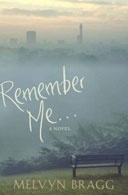
In their early days, Joe had liked to dwell on the unlikelihood of their meeting. It lent the glamour of the miraculous. How, if he had not been a young man of such refined intellect and high culture, he might never have escaped the coal-spattered streets of Wigton for the Arcadian delights of Oxford. How, if the number seven bus had broken down, he might never have arrived at the party.
"Your tortured longing reminds me of the engraving in my edition of Shelley's love poems," Joe pleaded with no sense of irony.
"Ah, Melvyn," Natasha replied earnestly. "Or should I call you Joseph for short. The dialectic of your northern simplicity and your Sartrean existential modernity pierces my Gallic heart."
And so, my daughter - if you will allow me the intertextuality of introducing you in this way to offset the dull self-absorption of the narrative - that is how your parents came to meet. Their friends were initially sceptical. She was French, an artist, older, recovering from a doomed love affair. He was chippy, determined to throw off the shackles of his Cumbrian roots and release his bouffant locks on to the stage of metropolitan bohemia. And yet, when their friends heard them overlaying the most trivial of thoughts and feelings with unctuous gravitas, they could sense the relationship's imperative dynamics.
"I have an intense, dark, troubled back story, mon cher Melv ... I mean Joseph," Natasha murmured. "Yet I believe your self-love can save me."
Joe caught his reflection in the mirror and teased a stray hair back in to place. "Marry me," he whispered. Why had he asked her that? Was he still trapped in a petit-bourgeois Wigtonian mindset that suggested he should be grateful for regular sex? Perhaps so. But did she not also admire his genius?
And so, my daughter, your parents came to be married. It was not easy at first. Their parents did not understand their love. His were good-hearted simpletons from oop north who were bedazzled by the neon brilliance of 1960s London. Hers were complex European structuralists. And yet, like cliched moths drawn to a flame, their love for one another burned with the brilliance of magnesium.
"I am tired of redefining the arts documentary for the BBC," Joe insisted with languid indifference one day. "Harold Pinter and Tom Stoppard tell me I am the most gifted writer of my generation and that I should write novels."
"And they are right, Joseph," Natasha concurred. "Your prolix, undisguised autobiographical indulgences are a beacon for us all. How I wish my own poetry had your sensitivity for the banal. Now let us have a child."
And so, Marcelle, you came to be born. You were much loved, though it was not easy at first. Your mother was tormented by her relationship with her father and your father was distracted by the planes that o'erflew their house in Kew. "My analyst says I cannot be healed unless you too undertake analysis," Natasha implored him one afternoon after he returned from Les Enfants du Paradis.
Joe felt trapped in a Borgesian, almost Kleinian, dilemma. Would analysis expose the heady mix of pride and shame he felt in his Cumbrian upbringing? Yet after some resistance, he demurred and found that he had greater depths than even he had dared suspect. It was after one engrossing session that he had met Helen.
"It is not some tawdry affair," he said. "It is la vraie passion. But I love you too."
"Do not allow your conceptions of fatherhood and marriage to restrict your freedoms," Natasha replied. He was fortified by her love. Yet hesitant. "Sex is not enough. We need analysis to repair the inevitable failings of idealism and romanticism."
Helen held him as the divorce came through. He should have gone to her. He does not go. He does not go. He overwrites terribly.
And so, Marcelle, your mother committed suicide. Was I to blame? Would she have even wanted to read such self-indulgent cack?
The digested read, digested: I'm trying to forget ...

